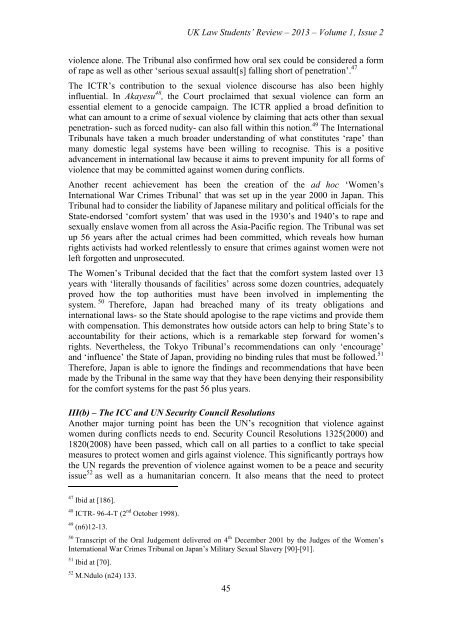Open UKLSR Volume 1(2) - Uklsa
Open UKLSR Volume 1(2) - Uklsa
Open UKLSR Volume 1(2) - Uklsa
You also want an ePaper? Increase the reach of your titles
YUMPU automatically turns print PDFs into web optimized ePapers that Google loves.
UK Law Students’ Review – 2013 – <strong>Volume</strong> 1, Issue 2<br />
violence alone. The Tribunal also confirmed how oral sex could be considered a form<br />
of rape as well as other ‘serious sexual assault[s] falling short of penetration’. 47<br />
The ICTR’s contribution to the sexual violence discourse has also been highly<br />
influential. In Akayesu 48 , the Court proclaimed that sexual violence can form an<br />
essential element to a genocide campaign. The ICTR applied a broad definition to<br />
what can amount to a crime of sexual violence by claiming that acts other than sexual<br />
penetration- such as forced nudity- can also fall within this notion. 49 The International<br />
Tribunals have taken a much broader understanding of what constitutes ‘rape’ than<br />
many domestic legal systems have been willing to recognise. This is a positive<br />
advancement in international law because it aims to prevent impunity for all forms of<br />
violence that may be committed against women during conflicts.<br />
Another recent achievement has been the creation of the ad hoc ‘Women’s<br />
International War Crimes Tribunal’ that was set up in the year 2000 in Japan. This<br />
Tribunal had to consider the liability of Japanese military and political officials for the<br />
State-endorsed ‘comfort system’ that was used in the 1930’s and 1940’s to rape and<br />
sexually enslave women from all across the Asia-Pacific region. The Tribunal was set<br />
up 56 years after the actual crimes had been committed, which reveals how human<br />
rights activists had worked relentlessly to ensure that crimes against women were not<br />
left forgotten and unprosecuted.<br />
The Women’s Tribunal decided that the fact that the comfort system lasted over 13<br />
years with ‘literally thousands of facilities’ across some dozen countries, adequately<br />
proved how the top authorities must have been involved in implementing the<br />
system. 50 Therefore, Japan had breached many of its treaty obligations and<br />
international laws- so the State should apologise to the rape victims and provide them<br />
with compensation. This demonstrates how outside actors can help to bring State’s to<br />
accountability for their actions, which is a remarkable step forward for women’s<br />
rights. Nevertheless, the Tokyo Tribunal’s recommendations can only ‘encourage’<br />
and ‘influence’ the State of Japan, providing no binding rules that must be followed. 51<br />
Therefore, Japan is able to ignore the findings and recommendations that have been<br />
made by the Tribunal in the same way that they have been denying their responsibility<br />
for the comfort systems for the past 56 plus years.<br />
III(b) – The ICC and UN Security Council Resolutions<br />
Another major turning point has been the UN’s recognition that violence against<br />
women during conflicts needs to end. Security Council Resolutions 1325(2000) and<br />
1820(2008) have been passed, which call on all parties to a conflict to take special<br />
measures to protect women and girls against violence. This significantly portrays how<br />
the UN regards the prevention of violence against women to be a peace and security<br />
issue 52 as well as a humanitarian concern. It also means that the need to protect<br />
47 Ibid at [186].<br />
48 ICTR- 96-4-T (2 nd October 1998).<br />
49 (n6)12-13.<br />
50 Transcript of the Oral Judgement delivered on 4 th December 2001 by the Judges of the Women’s<br />
International War Crimes Tribunal on Japan’s Military Sexual Slavery [90]-[91].<br />
51 Ibid at [70].<br />
52 M.Ndulo (n24) 133.<br />
45


